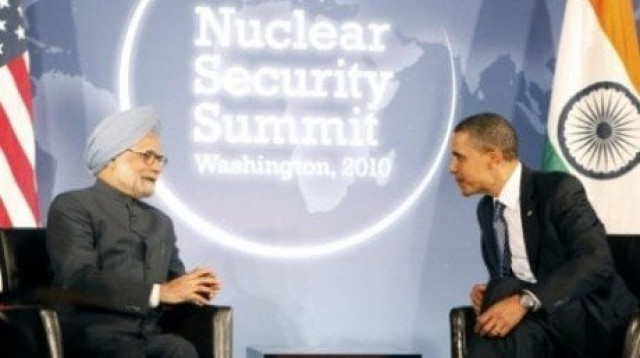India may have to wait to join sensitive nuclear export body
Countries worry about the implications of allowing India to enter the NSG.

US relations with India have warmed markedly in the past decade. PHOTO: REUTERS
The United States, Britain, France are among countries pushing for allowing India - a growing market for such commerce - to join the 48-nation Nuclear Suppliers Group (NSG), a move that would boost the Asian nation's status as an atomic power.
But others worry about the implications for wider efforts to prevent the spread of atomic bombs if a country that has refused to sign a global anti-nuclear weapons pact were to enter a group which has a key role in countering proliferation of these arms.
If India joined the group, set up in 1975 to ensure that civilian nuclear technology exports are not diverted to make atomic arms, it would be the only member that is outside the 189-nation nuclear Non-Proliferation Treaty (NPT).
"There are concerns that still need to be addressed," one diplomat said. Like others, he declined to be identified in view of the confidential discussions in the consensus-based NSG.
A Western diplomat, from a country which like several others has yet to take a clear position on the issue, said: "It is not a done deal. We have to continue the discussions."
They were speaking after the NSG's annual meeting last week, where Britain argued in a paper that India qualifies given the size of its civilian atomic industry and commitment to stopping the spread of military material.
Western powers have taken a strong interest in the nuclear emergence of India - particularly its ambition to expand its capacity in the next 20 years by adding nearly 30 reactors, making it an attractive market for technology exporters.
Asian rivalries
Proponents say it is better to have India, expected to become a big nuclear supplier itself, inside than outside the NSG as it would ensure that it adheres to the group's guidelines for sales of nuclear and nuclear-related goods.
"There are good reasons for having it in the club," the Western diplomat said. He added, however, that getting there could be a "slow process".
The diplomats said they did not believe the issue would be decided already at next year's NSG meeting. India is only expected to apply when it is confident it will be let in. Critics warn it would undermine the credibility of the NSG.
Trying to "shoehorn India's entry" could trigger lobbying on the part of nuclear-armed, non-NPT members Pakistan and Israel to allow them to also join, said Daryl Kimball of the Arms Control Association, a US research and advocacy group.
Washington sealed a civilian nuclear supply deal with India in 2008 that China and others found questionable because Delhi is not part of the NPT. This ended India's nuclear isolation and could mean billions of dollars in business for US firms.
Britain is also exploring a nuclear cooperation deal with India. India - Asia's third-largest economy - would need the support of all NSG members to join the secretive body. The diplomats declined to comment on which countries remained sceptical.
After an informal meeting in March in Vienna, participants said Ireland, the Netherlands and Switzerland seemed to be among those still having doubts.
China is also believed to have reservations, influenced by by its ties to its ally Pakistan, India's arch geo-political rival, which has also tested atomic bombs, analysts say. India and Pakistan - which have fought three wars - are both outside the NPT, which would oblige them to scrap nuclear weapons.
Five world powers - the United States, Russia, China, Britain and France - in the NSG have nuclear arsenals but were allowed to keep them under the NPT because they predated the 1970 treaty, although they committed to disarming eventually.



















COMMENTS
Comments are moderated and generally will be posted if they are on-topic and not abusive.
For more information, please see our Comments FAQ